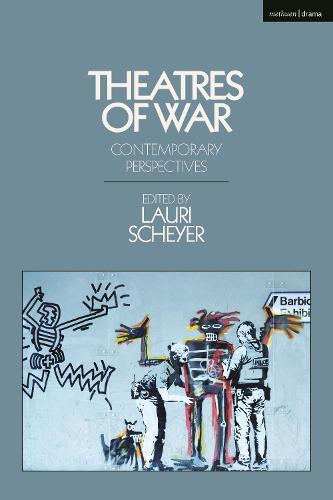Overview
Why do so many writers and audiences turn to theatre to resolve overwhelming topics of pain and suffering? This collection of essays from international scholars reconsiders how theatre has played a crucial part in encompassing and preserving significant human experiences. Plays about global issues, including terrorism and war, are increasing in attention from playwrights, scholars, critics and audiences. In this contemporary collection, a gathering of diverse contributors explain theatre’s special ability to generate dialogue and promote healing when dealing with human tragedy. This collection discusses over 30 international plays and case studies from different time periods, all set in a backdrop of war. The four sections document British and American perspectives on theatres of war, global perspectives on theatres of war, perspectives on Black Watch and, finally, perspectives on The Great Game: Afghanistan. Through this, a range of international scholars from different disciplines imaginatively rethink theatre’s unique ability to mediate the impacts and experiences of war. Featuring contributions from a variety of perspectives, this book provides a wealth of revealing insights into why authors and audiences have always turned to the unique medium of theatre to make sense of war.
Full Product Details
Author: Lauri Scheyer (Hunan Normal University, China)
Publisher: Bloomsbury Publishing PLC
Imprint: Methuen Drama
Weight: 0.481kg
ISBN: 9781350132924
ISBN 10: 1350132926
Pages: 216
Publication Date: 21 October 2021
Audience:
College/higher education
,
Tertiary & Higher Education
Format: Hardback
Publisher's Status: Active
Availability: Manufactured on demand 
We will order this item for you from a manufactured on demand supplier.
Table of Contents
Contributor Biographies Introduction, Lauri Scheyer, Hunan Normal University, China Section I: British and American Perspectives on Theatres of War Carry on to the Place of Pain: Embodiment and Aversion in Sean O'Casey's The Silver Tassie, Robert Brazeau, University of Alberta in Edmonton, Canada I Do Want to Take Part in this Show: The Early War Diary as Rehearsal Stage for the Creation and Navigation of the Newly Militarized Masculine Self, Nancy Martin, Rutgers University, USA Mothers and Lovers Mourning Fallen Soldiers: Tracing the Shift from Victorian Age to Interwar Period Mourning in Noel Coward's Post-Mortem, Anna Rindfleisch, Kings College London, UK The Romans at War: Shakespeare's Julius Caesar and Antony and Cleopatra on the Nazi Stage, Alessandra Bassey, Kings College London, UK Terror and Eros in Ernest Hemingway's The Fifth Column-A Play on the Spanish Civil War, Jon Woodson, Howard University, USA Joshua McCarter Simpson's Counter-Performances of American Civil War Nationalism, Lauri Scheyer Performing Trauma: Narratives of Rupture in Caryl Churchill's Seven Jewish Children, Mamata Sengupta, Islampur College, North Bengal University, India Two Truths and a Lie: Theatrical Form, Plays About Terrorism, and the Search for Understanding, Lindsey Mantoan, Linfield College, Oregon, USA Section II: Global Perspectives on Theatres of War Reenacting the Record: Theatrical Historiography in Alfian Sa'at's Tiger of Malaya, Kevin Riordan, Nanyang Technological University, Singapore Ferenc Molnar's White Cloud and World War I, Marta Pellerdi, Pazmany Peter Catholic University, Hungary Presenting Picasso Presents: Exploring the Process of Crafting and Staging Historical Docudrama, Annika C. Speer and Begona Echeverria, UC Riverside, USA War, Tyranny, and Political Sacrifice in Luis Velez de Guevara's Mas pesar el reyque la sangre y blason de los Guzmanes, Alani Hicks-Bartlett, Brown University, USA Seeing Through Discursive Screens in Matei Visniec's The Body of a Woman as a Battlefield in The Bosnian War, Oana Popescu-Sandu, University of Southern Indiana, USA Wartime Gender Advocacy and Revival of Theatre in Afghanistan, Bahar Jalali, independent scholar Section III: Perspectives on Black Watch Unities, Communities, and Disunities in Gregory Burke's Black Watch, Kate McLoughlin, University of Oxford, UK Better Break It: A Case Study of Black Watch, Christopher Merrill, University of Iowa, USA Gallant Forty Twa: The National Theatre of Scotland's Black Watch as Exemplary and Relevant Political Theatre, Shawn Lent , Columbia College Chicago, USA Black Watch and the Edinburgh Military Tattoo: Legacies of Scotland's Martial Identity, Lynn Ramert, University of Nebraska, USA Performing War: The Meaning of the Missing Sign of War in Media and Theatre, Eva Aldea, University of London, UK Section IV: Perspectives on The Great Game: Afghanistan My Country Has Been Imagined Enough: The Great Game, Neo-imperialism, and Gender, Daniel O'Gorman, Oxford Brookes University, UK and Emer O'Toole, Concordia University, Canada The Geography of Identity, Reza Aslan, University of California, USA The Legacy of an Empire, Farid Younos, California State University, USA Imagining The Great Game, Christopher Merrill Staging the Catastrophe: The Tricycle Theatre's The Great Game: Afghanistan and Its Diplomatic Journey from London to the Pentagon, 2010-11, Nicholas J. Cull, University of Southern California, USA The Freedom of Boredom, Shane Belvin, independent scholar Understanding Theatres of War: From Ancient Greece to Afghanistan to DARPA, Tyler Reeb, Center for International Trade & Transportation, USA Index
Reviews
Author Information
Lauri Scheyer is Xiaoxiang Scholars Program Distinguished Professor, Director of the British and American Poetry Research Center, and Co-editor of Journal of Foreign Languages and Cultures at Hunan Normal University, China. She directed the British Council International Videoconference on The Great Game: Afghanistan, and co-directed (with Professor Robert Eaglestone of Royal Holloway University of London) the British Council International Videoconferences on Black Watch and the 200th Anniversary of the Abolition of the British Slave Trade. She publishes widely on topics relating to art as social and political action. Her books include Slave Songs and the Birth of African American Poetry, The Heritage Series of Black Poetry, and A History of African American Poetry.
Tab Content 6
Author Website:
Customer Reviews
Recent Reviews
No review item found!
Add your own review!
Countries Available
All regions
|




